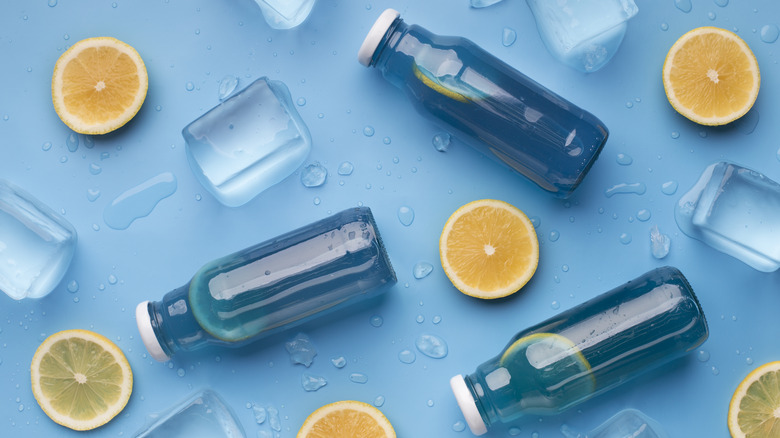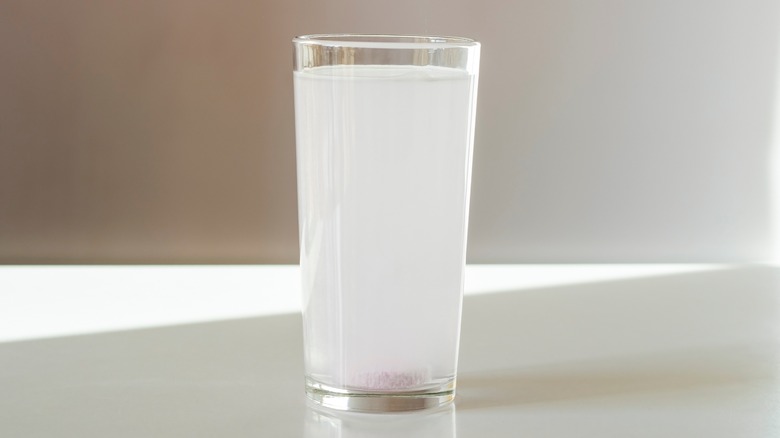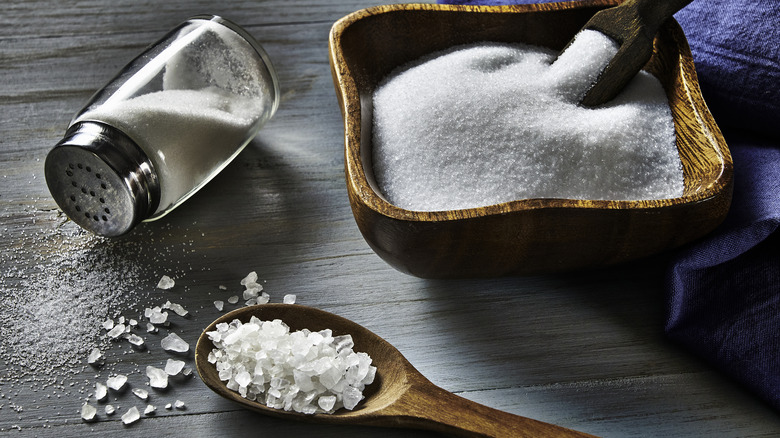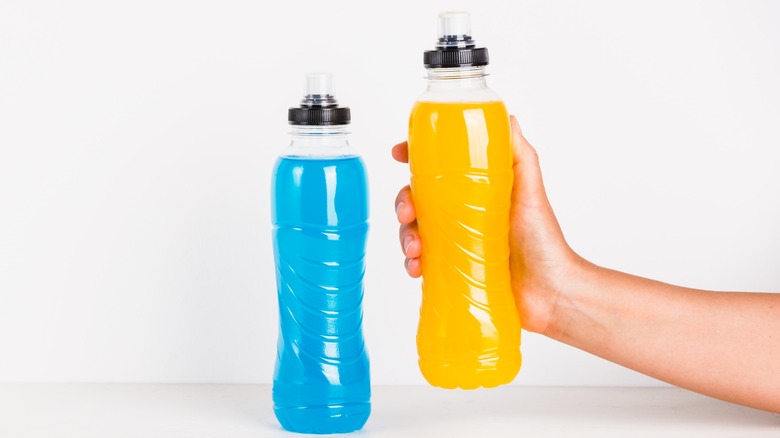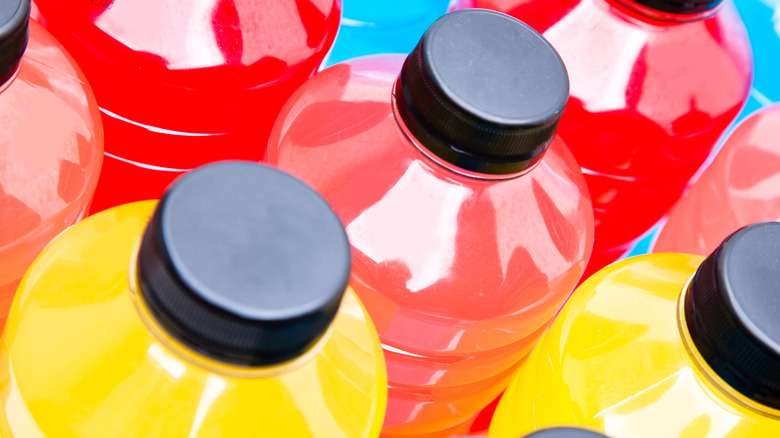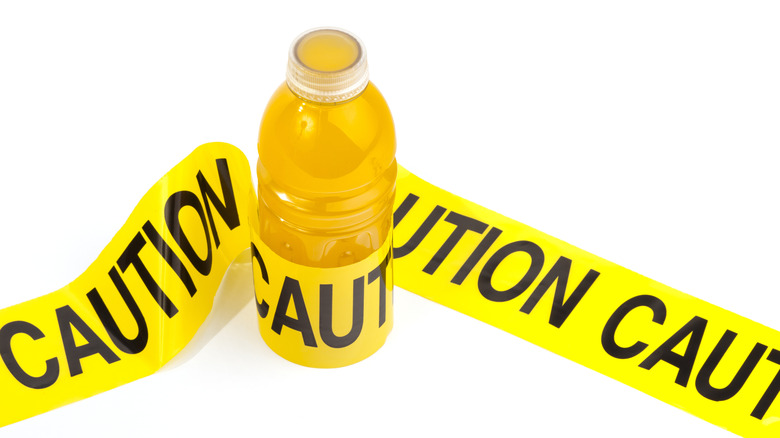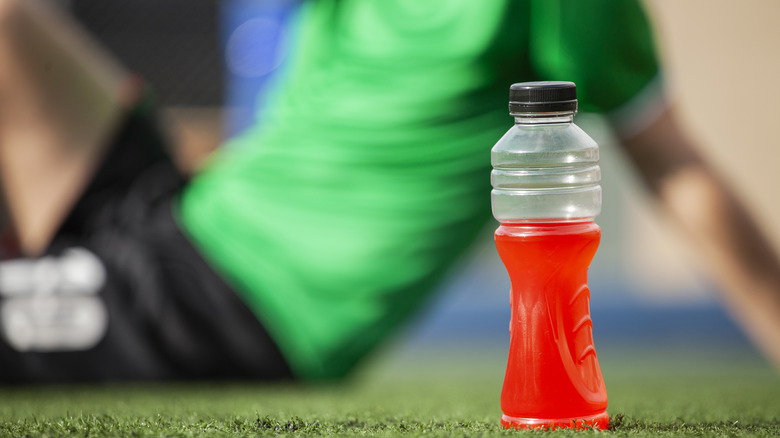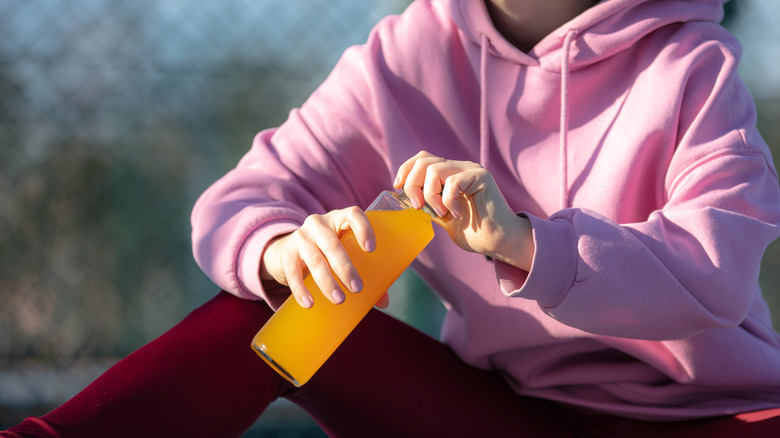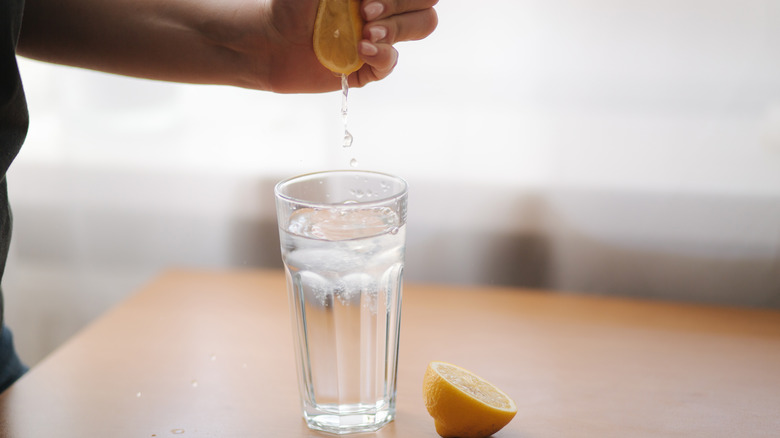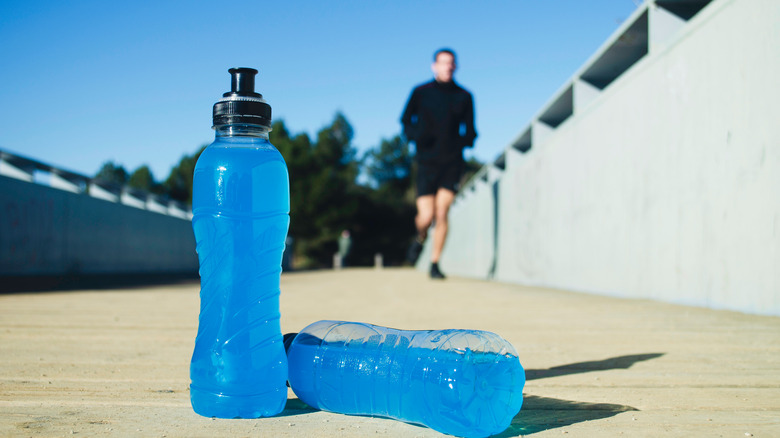What Makes A Sport Drink Truly Hydrating?
Water is essential for the human body to function — the body is made up of 60% of it, after all. So, what happens if and when water is not enough? Enter the prolific sports drink.
When you hear the words "sports drink," you might think of flashy Gatorade commercials featuring celebrity athletes. Or, you may automatically think of your favorite flavor or brand as you search through the brightly colored bottles at the grocery store. Whatever you land on, you know that this drink is synonymous with athleticism. It's designed to help you stay hydrated during workouts and get you fueled up efficiently and quickly. There's also no denying that the sports drink industry is a force to be reckoned with. Since its invention in 1965 to keep University of Florida football players from losing too much fluid while sweating in the harsh, humid climate, more and more brands have entered the arena. The ingredients these days can vary from brand to brand, with some concoctions claiming to have more health benefits than others. All the same, though, there's one main question that rings true for every sports drink on the market: What makes a sports drink truly hydrating?
The main ingredient of sports drinks: electrolytes
Sports drinks can be classified as "functional beverages," or drinks that are designed to provide the body fuel as it rapidly drains its resources through sweat and urine (per the National Library of Medicine). But, what is this mysterious, powerful ingredient floating around in sports beverages? It's electrolytes. The body uses electrolytes primarily in the central nervous system and bloodstream. They help with key functions like core temperature regulation and blood flow (per David S. Rowlands, Brigitte Hani Kopetschny, Claire E. Badenhorst). From the central nervous system firing off commands to the body to muscles contracting as you move, electrolytes are behind it all (from Continuum).
But, how are electrolytes able to do this? According to the Cleveland Clinic, "electrolytes are substances that have a natural positive or negative electrical charge when dissolved in water." This end result serves as the foundation of sports drinks. Electrolytes for the purpose of sports drinks really boil down to sodium, potassium, magnesium, and calcium, with the first two being the most commonly used (per R J Maughin). The four main electrolytes have positive charges to them that are integral to the electric charges happening on a cellular level during exercise. While you commonly get most electrolytes through diet, the body burns through them — and its main fuel source, carbs — during intense training.
Sodium is a key electrolyte for hydration
One electrolyte rises above the rest for its role in keeping the body working like a well-oiled machine during your workout: sodium. On a molecular level, sodium chloride is the basis behind everyday table salt, sea salt, and iodized salt. When sodium chloride is dissolved in water, you're left with a natural electricity conductor (hence, electrolyte). Water serves as the vessel, breaking up the compound to let each element attract electricity with either sodium's positive or chloride's negative charges. You've heard the saying, "The mitochondria is the powerhouse of the cell" from grade school science class, and electrolytes serve a key function here (per PUL Hydration). Water moves in and out of cells, bringing with it electrolytes and other elements the mitochondria needs to power on through. When you combine the trillions of cells that make up the body, seemingly simple movements actually require electric charges.
Keep in mind that the type (and ultimately quality) of sodium and H2O used in a sports drink can be a game-changer, quite literally, to your sports drink. According to Naturopathic physician Dr. Lauren Deville, natural salts such as pink Himalayan salt or sea salts bring with them trace minerals that also may support other areas of the body, such as your bones and blood. There's always too much of a good thing, so make sure to not overdo it with salt intake — too much can potentially lead to conditions like hypertension or high blood pressure.
Can you skip the electrolytes?
The question is, do you really need a sports drink to stay truly hydrated? Plot twist: Some experts say no. According to Brian M. Babka, MD at Northwestern Medicine, if your workout is under an hour, it's probably not necessary to pick up a sports drink. Your body needs the electrolytes and other supplements in the drink for grueling training that takes place over an extended period of time.
In cases where you use sports drinks for rehydration when you're sick, new studies are coming out saying you can skip it then, too, as the amount of high sugar versus electrolytes like sodium or potassium may end up being counterproductive for recovery (per Texas A&M Health). The same rings true for workouts, as some additives can ultimately be detrimental to athletic performance and overall health. This is especially true for those who have preexisting health conditions like diabetes where elevated blood sugar levels can be harmful (from the American Diabetes Association). While it seems like a simple solution to sidestep regular sports drinks in favor of sugar-free, lower-calorie options, it doesn't equate to it being a healthier choice. Artificial sweeteners and ingredients can also be bad news for your sports performance and long-term health (per Mayo Clinic).
Why are there carbs in my sports drink?
You may be surprised to know that there are indeed carbohydrates floating around in your sports drink — this is a good thing. Your body uses carbs as a fuel source, but these aren't the bread and starchy snacks you're thinking of. Blood glucose, or blood sugar, is the result of the body processing and absorbing carbs into your bloodstream (per Mayo Clinic). This is what ultimately is used by your body as a fuel source on a cellular level.
The sugars in sports drinks are ready for absorption into the bloodstream upon consumption (Harvard T.H. Chan School of Public Medicine). Sports drinks rely on sugars or polymerized glucose sources, like high-fructose corn syrup or glucose, which are then combined with the electrolytes to become the one-stop-shop you reach for during tough intervals of exercise. Depending on how much sugar you are gulping down per serving, it may not be the healthiest option, especially if you're training toward a goal or looking to recover. Andrew Nish, MD of UnityPoint Health states that "sports drinks will provide two to 19 grams of carbohydrate per eight ounces" and that the body can take on liquid, carb-focused drinks at 30 to 60 grams per hour. When you do the math on a lot of popular sports drinks, you'll find it's a lot of sugary carbs in one go, so take it slow and easy when swigging the sports drink.
Hidden ingredients to look out for
Premixed sports drinks are undoubtedly convenient, but that ready-to-go formulation can come with hidden ingredients you may want to look for and possibly avoid. Beyond electrolytes and water, many brands include high amounts of sugar, chemical additives, preservatives, or other enhancers that ultimately may hurt, not help, your athletic progress. Because of added sugar alone, popular products like Gatorade Thirst Quenchers and Powerade can contain anywhere from 34 to a whopping 48 grams of sugar per bottle. These bottles usually contain two or more servings, but consumers have to be mindful when ingesting.
Sweeteners aren't the only thing to watch. Sports drinks like the Gatorade Fast Twitch Drink, which contains 200 milligrams of caffeine, are designed to help energize and enhance athletic performance. While that amounts to a bit more than two cups of coffee a day, the addition of caffeine brings its own set of concerns in tandem with sweeteners and artificial flavoring. According to one study published in Pediatrics, caffeine poses a risk especially for kids and young adults, as it can dehydrate and deplete electrolyte levels in the body. Despite the more ominous additions to sports drinks and their possible effects on the body, this doesn't mean you have to skip sports drinks altogether. Rather, take time to read over labels and make sure you know what you're fueling your body with.
Which sports drink is most hydrating?
This is a trick question, as it depends on the circumstances and who plans on using it. Healthcare professionals like Martha Gonzalez, RD, LD, CLC recommend sticking to water to cut the calories, sugar, and other additives, especially if you are just planning on doing a short workout. If you need something that takes things up a notch, you can opt for sports drink brands that like to stick with natural electrolyte sources. For instance, coconut water naturally contains electrolytes like potassium and sodium (per Mayo Clinic). Brands like Vita Coco or Harmless Harvest Coconut Water use the product to enhance their sports drinks with extra vitamins and minerals.
If you're still keen on sticking with a more old-school sports drink, there are plenty of hydrating options abound — it just depends on your personal preferences. In our ranking of 18 hydration drinks, brands like NOOMA Organic Electrolyte Sports Drink and Liquid IV Hydration Multiplier topped the charts. You're not limited to liquid versions, either. Sports drinks come in all forms, from dissolvable tablets to mixable powders, and even hydration gummies. It will all boil down to what form of sports drink you're looking for, and if there are any extras you'd like with it to give your body an extra boost.
Who are sports drinks really for?
Sports drinks were primarily made for adult, professional athletes to help them push through the most rigorous training sessions. While that still rings true, there is no one version of what an athlete looks like these days. While kids and adults alike can enjoy and benefit from using sports drinks for workouts these days, there is a caveat: You should only use them for particular scenarios. It's best to stick to sports drinks if you have a longer workout, if you're outdoors and it's hot, or even if you are someone that sweats a substantial amount. For kids in particular, water is preferred but sports drinks can be useful for hydration and fuel purposes, especially in scenarios that require higher energy exertion (per Children's Hospital Colorado).
Since sports drinks were originally invented for the collegiate football team at the University of Florida, it goes without saying that athletes can really benefit from using them during training. For athletes, keeping a gauge on how much sweat is expensed during training will be the deciding factor in not only the type of sports drink to opt for but the amount of electrolytes in them, too (per U.S Masters Swimming). No matter what group you fall into, as a general rule, it's important not to overdo it with electrolytes. Electrolyte imbalance can lead to a variety of nasty side effects, including nausea, diarrhea, or even difficulty breathing or regulating heart rate (per Cleveland Clinic).
DIY sports drinks
You've probably figured out at this point that it's not hard at all to create your own DIY sports drink — it's just salt and water, right? Technically yes, but you can add more elements to give your body a variety of electrolytes, vitamins, and minerals. Not to mention, it'll probably taste a lot better with extra add-ins, too. Just make sure you have three important ingredients on hand: sugar, salt, and water. Bicycling magazine also recommends adding a splash of juice from lemons or limes for some extra zest or throwing in some honey and coconut water for sweetness and carbs.
If you're pressed for time but need to make sure you have a source of fuel on hand, there are also plenty of foods that can supply electrolytes. Grab some pretzels, salty crackers, or even salted nuts to stock up on sodium. If you need potassium, bananas, avocado, coconut, leafy greens, and legumes all naturally contain this electrolyte. Remember to keep water on hand, too, as hydration is key here!
Do you really need a sports drink?
At the end of the day (or workout), is a sports drink really necessary? If you're coming out of a particularly grueling practice, or got a ways to go during a race, it can be. Sports drinks are a fast, efficient way to get your body the crucial elements it needs, namely water, electrolytes, and carbohydrates for fuel. But, if it's a quick walk in the park or a stretch session for 45 minutes, just stick to plain old water.
The problem sports drinks aim to solve above all else is hydration, and monitoring your hydration levels during exercise is needed to determine if you need a sports drink at all. To get an idea, the U.S. Anti-Doping Agency recommends weighing yourself before and after intense workouts to see if there is any water weight loss, suggesting that you consume about one cup of water for every pound lost. Additionally, pay attention to the color of your urine — the darker yellow it is, the more dehydrated you are. Lastly, the USADA recommends taking a water break every 15–20 minutes to replenish fluids. So, whether it's sports drink or water, it's time to drink up!
